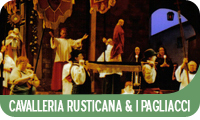Kentucky Opera performed its final dress rehearsal of both Mascagni's Cavalleria Rusticana and Leoncavallo's I Pagliacci Wednesday night, opening this weekend at the Brown Theater. Both operas came out of the verismo movement in Italy -- the portrayal of everyday people and stories, rather than the grand action of royalty and nobles that had previously dominated most great works of art. The schemer Tonio from Pagliacci's Prologue calls these stories "slices of life" and they were intended to be much more immediate and familiar to audiences who didn't happen to have Lord and Lady appended to their names.
The two operas are often performed together, having come out of the same movement, but more strikingly, they treat the same theme. Much as our modern crime and legal dramas turn on domestic betrayals and the murders that follow, so do these popular stories. Anyone who regularly watches CSI and Law and Order will not be terribly out of their depth following the actions of these entangled spouses and lovers.
The rustic charm of provincial Italy is captured nicely by the set design, which serves both shows with a just a few changes. The weathered facade of a church features prominently in Cavalleria Rusticana, which comes first, and is later replaced for I Pagliacci with a simple traveling stage, set up in the village square. The costumes reflect the relative status of small-town and rural characters in what looks to be an early 20th century setting.
In Rusticana, young Santuzza (soprano Kara Shay Thomson) confesses to the mother of her caddish lover Turiddu (tenor Michael Wade Lee) that she has been seduced and abandoned by him even though she is now pregnant. Turiddu is carrying on with his former love, who is now married to the often absent-on-business Don Alfio (baritone Lester Lynch). Mamma Lucia (mezzo Rebekah Bortz Hardin) is sympathetic, but ultimately is not much help to the poor girl, who continues to plead with Turiddu to give up his other woman in order to restore her honor.
I would like to say the sight of Santuzza literally hanging on Turiddu's leg and begging the sorry bastard not to leave her is jarring to the modern audience, but unfortunately, that's not so much the case, as dreary episodes like this unfold on reality television and Facebook every day.
The principals handle their roles well, although it's hard to create the dramatic energy you might expect, when all the really juicy action takes place off stage and is reported by others to the audience. This shortcoming is, of course, baked into the libretto and not the fault of the cast. We never see the lovers in the prime of their passion, for example -- Santuzza and Turiddu are well past that -- all we see is the bitterness and recrimination that come afterward.
The only time you really feel some sparks flying is when Santuzza rats out Turiddu to Don Alfio. Thomson does a fine job of showing both the angry desire to have herself avenged and the guilty knowledge that she is going to create multiple tragedies to get it. She and Lynch had a nice chemistry here, both vocally and physically. But alas, even the murder takes place off stage, so the opera audience is spared the cathartic litter of bodies in the finale. Instead, we see the lonely sight of Santuzza standing alone as the last light fades.
I Pagliacci follows after the intermission and makes up for the former's unseen fireworks by bringing all the canoodling and fighting to center stage. The players arrive to the delight of the townsfolk -- blustering Canio (tenor John MacMaster), his unhappy young wife Nedda (soprano Elizabeth Caballero), and the lurching and leering clown Tonio (baritone Lester Lynch doing double-duty).
Nedda has fallen for local swain Silvio (baritone Michael Mayes) and when she spurns Tonio's clumsy advances, he decides to get her back by leading Canio to discover the guilty lovers in the act. Silvio gets away, Canio and Nedda fight, but she refuses to name her lover, and meanwhile the show must go on as the townspeople are gathering for the "play." The drama is that the reality exactly mirrors what the eager crowd is expecting to see on stage.
Because the role of Canio is so iconic (think Luciano Pavarotti on the cover of one of his albums as Pagliaccio) and the aria Vesti la Giubba is so famous, people tend to be much more familiar with Pagliacci, and its fame is deserved. The beautiful melodies make you remember why a night at the opera is hard to beat for the pure romance of the setting. Caballero and Mayes make an attractive and believable pair as they sing their lovely duet of yearning and promise. And when MacMaster sings the centerpiece aria, he makes you feel the wounded pride and pain that the betrayed feel, even as you have just left off identifying with the star-crossed lovers who caused it. When you manage to pull off that duality, you have gone a long way toward successfully performing I Pagliacci.
The only quibble I had with the latter offering was the unfortunate costuming choice that put the very pretty Elizabeth Caballero in a frumpy, flowered robe for her romantic duet with Silvio. It brought to mind more the housewife who interrupted her ironing to watch Oprah than a bewitching beauty who ensnares the heart of every man she meets. That being said, the rest was beautifully done, the singers were in good voice, making the double-bill of classic Italian opera well worth a visit to the cozy confines of the Brown Theater for either opening night this Friday or the Sunday matinee.
There are two performances of the Cav/Pag bill at the Brown Theater,
315 W. Broadway: Friday, September 24 at 8:00 p.m. and Sunday, September
26 at 2:00 p.m. Buy tickets online or by calling 502.584.7777.



